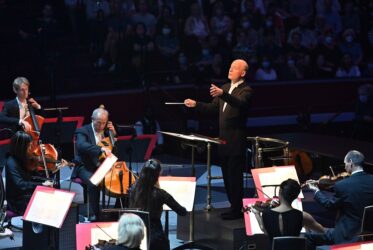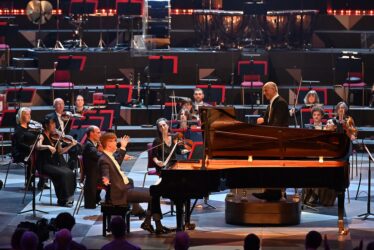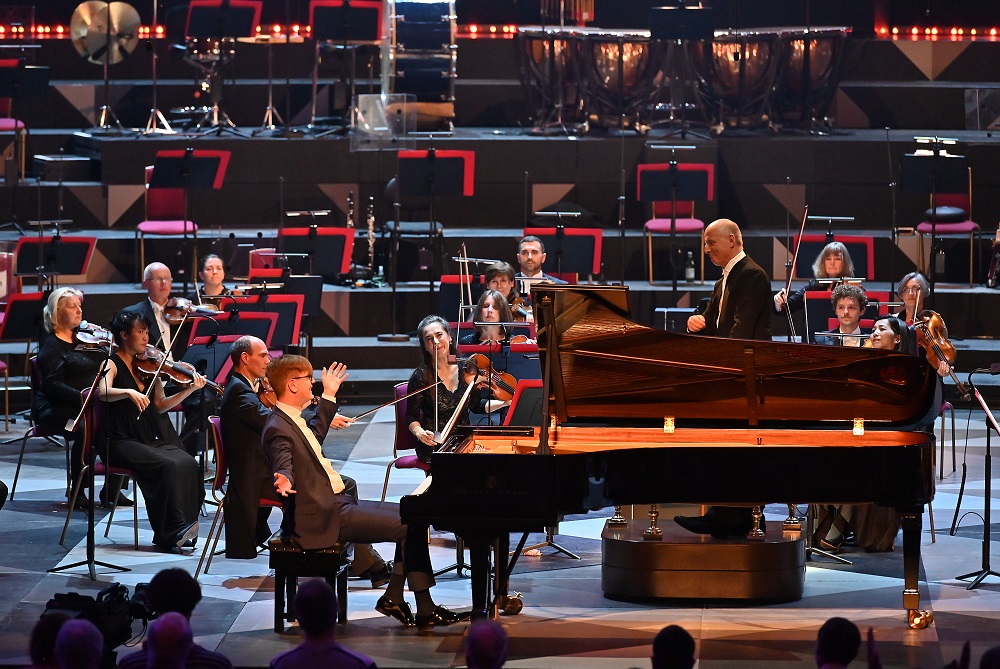
 United Kingdom BBC Proms 2021 [10]: Prokofiev, Bach, Mozart, Shostakovich: Vikingur Ólafsson (piano), Philharmonia Orchestra / Paavo Järvi (conductor). Performance at Royal Albert Hall, London, 14.8.2021 and viewed on BBC Sounds. (CC)
United Kingdom BBC Proms 2021 [10]: Prokofiev, Bach, Mozart, Shostakovich: Vikingur Ólafsson (piano), Philharmonia Orchestra / Paavo Järvi (conductor). Performance at Royal Albert Hall, London, 14.8.2021 and viewed on BBC Sounds. (CC)

Prokofiev – Symphony No.1 in D, Op.25, ‘Classical’ (1916/17)
Bach – Keyboard Concerto in F minor, BWV 1056 (1738)
Mozart – Piano Concerto No.24 in C minor, K.491 (1786)
Shostakovich – Symphony No.9 in E flat (1945)
To an extent, the Royal Albert Hall’s acoustic dooms pieces that require clockwork precision and accuracy such as Prokofiev’s ‘Classical Symphony’. All credit to the Philharmonia Orchestra, then, for presenting such a wonderfully characterful and a lovely performance of Prokofiev’s Haydnesque offering. If ever there was an orchestra equipped for the high-lying string lines of the second movement, it is this one, and how gracious those melodies sounded here, garlanded by woodwind and underpinned by pure charm. The glorious swagger of the launch into the third movement was magnificent; and what delicious risks Paavo Järvi took with the tempo in the final bars. The finale, helter-skelter, was always in control and, true to the spirit of the music, genuinely funny.
Making his Proms debut at this concert, Icelandic pianist Vikingur Ólafsson brought two concertos, the first of which was the Bach F minor. Ólafsson’s clarity of articulation was immediately apparent in the moderately paced first movement. The contrast of the rigour of the opening appeared in high contrast to the aria of the slow movement, Ólafsson’s limpid treble line heard against perfectly judged pizzicatos in the strings. Ólafsson created a place of ultimate rest, the finale bursting in like a Bachian steamroller.
In his interval interview, Ólafsson refers to Edwin Fischer’s Bach as an interpreter he particularly admires, and one can hear a purity of intent that is absolutely congruent.
Originally it was Santtu-Mathias Rouvali who was due to conduct this Prom, but he had to pull out at short notice. But the rapport between Järvi and the Philharmonia is clear. We heard that in the Prokofiev, to be sure, but it was even clearer in the exposition to the first movement of the Mozart K.491, the C Minor concerto. Powerful yet lean, the Philharmonia set the stage. Ólafsson’s riposte was limpid, beautiful, perfectly realised. Ólafsson is a pianist who plays with technical precision, complete intellectual acuity and yet there is no resultant loss of emotionality. He offers a remarkable combination – unique today, perhaps? Equally remarkable was the cadenza (Ólafsson’s own). Ólafsson brought some lovely decorations to the slow movement, while the finale was replete with proto-Beethovenian explorations (and how even is Ólafsson’s left hand!). Most remarkable is now Ólafsson enables some passages to sound entirely modern, absolutely of the present day; totally in keeping to that aesthetic was the modernity of the small cadenza in the finale.

Certainly, Järvi and Ólafsson have performed this piece together before (for example, in April 2021 with the Concertgebouw Orchestra and with Schumann’s ‘Rhenish’ post-interval). There is definitely a sense of resonance and empathy between the two musicians.
Then, no fewer than two encores. What a Prom debut this was! One can only hope he comes back (something of an inevitability, I would have thought). First up, some Bach, perhaps unsurprisingly given Ólafsson’s discography. An arrangement by August Stradal of the Andante from the Organ Sonata No.4, BWV 528, delivered with limpid beauty, expanding to the most remarkably noble climax. And to send us towards Shostakovich in the calmest of moods, Ólafsson then gifted us Liszt’s arrangement of Mozart’s Ave Verum Corpus.
Shostakovich’s Ninth worked beautifully in this context, its lightness balancing the opening Prokofiev. Lots of humour to this performance, particularly from the brass in the first movement, and Järvi’s way of leaving disjunct gestures to speak for themselves paid huge dividends. This conductor’s clear regard for this symphony was absolutely obvious in his handling of the first slow movement, the Moderato, perfectly paced and really a profound statement. Superb flute solos from Charlotte Ashton were a highlight of a simply gorgeous moment. How sparkling, too, the central Presto. This was a magnificent performance of drama, highlights including a beautifully plangent bassoon solo (Emily Hultmark, who excelled throughout) and a responding wall of brass. Humour once again ran riot in the finale (Allegretto–Allegro); a great performance to crown a wonderful BBC Prom.
Colin Clarke

What an excellent review of a superb Proms concert. Thank you Colin Clarke